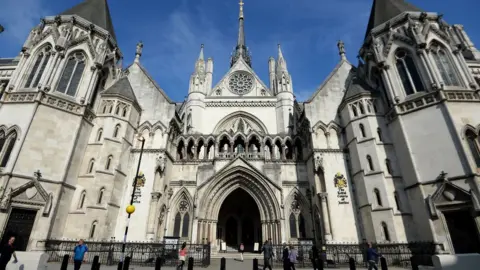PKU funding battle: Family wins High Court challenge over drug
 BBC
BBCThe family of a seven-year-old boy whose condition could cause brain damage have won a High Court challenge over an NHS decision not to fund a life-changing drug.
The child, "S", has a rare condition that means he cannot break down an amino acid, and he is autistic, which makes controlling his diet difficult.
A judge quashed the funding decision and sent it for reconsideration.
NHS England said it will reconsider but the ruling will not affect other cases.
The parents of the boy, who has phenylketonuria or PKU, want a drug called Kuvan to help him metabolise phenylalanine, an amino acid found in some proteins, which would cost about £100 a day.
If the boy ate normally, protein would accumulate in his blood in dangerous concentrations.
'Difficult two years'
But Mrs Justice Andrews said: "Whilst this judgment is bound to give rise to a degree of optimism, I must caution against raising hopes too high.
"The fact that this claim for judicial review has succeeded does not mean that there will necessarily be a favourable outcome to this IFR (individual funding request) application."
The boy's father said: "We are very pleased that the court has ordered that NHS England reconsider their decision not to fund Kuvan for our son.
"It's been a very difficult two years for our whole family and we are hoping that the funding will be granted soon, so that our son's quality of life can be improved significantly."
'Unfair and inhumane'
An NHS consultant who was treating S, at Birmingham Children's Hospital, first applied to NHS England by an IFR for funding for Kuvan on the grounds the boy's case was "exceptional".
The boy's father told the court that the management of his condition had become more difficult over time because he had grown more interested in normal foods since going to school and seeing other children eat.
He would be able to get a proportion of vitamins and minerals from ordinary food if he was prescribed the drug.
S's father said the NHS's decision was "extremely frustrating, unfair and inhumane".
"No family should have to fight with the NHS for over 18 months to ensure that their child is given proper treatment," he said.
"It is clear to me they do not want to fund this life-changing drug."
 PA
PAThe family's counsel, Ian Wise QC, told the court that differing reasons had been given by NHS England for repeatedly refusing the funding for the drug.
He said this left S at risk of the consequences of poorly-controlled PKU.
Jenni Richards QC, for NHS England, told the court that the main part of PKU treatment was dietary control, even with Kuvan.
She said S's consultant acknowledged that the boy's overall development in terms of neurological impairment would mostly be affected by the severity of his autism rather than his PKU.

Analysis
By Michelle Roberts, BBC News
PKU can be managed by following a strict diet that limits foods containing phenylalanine - the amino acid these patients have difficulty with.
Child S also has autism, and his parents say controlling his condition through diet alone, avoiding or limiting foods like eggs, meat, fish and cheese, is too challenging.
The drug Kuvan is a treatment that provides the body with a substance that helps break down phenylalanine, but it only helps some people with PKU. Even if the medication does help, patients still need to control their diet.
The drug is also expensive - costing about £100 a day.
NHS England, which take into account a drug's cost versus benefit when making prescribing decisions, has so far refused to fund Kuvan for child S.

In her ruling, the judge said if the term "clinical effectiveness" was properly interpreted, the evidence that the drug was clinically effective was "overwhelming".
"Given that the supposed absence of evidence of clinical effectiveness was the specific reason given... for turning down the application, that is such a material error that it suffices in and of itself to warrant quashing the decision and sending it back for reconsideration," she said.
The judge said the funding panel "could still lawfully decide to refuse funding".
"It is their decision, and their decision alone; and provided it is taken on the basis of the correct interpretation of the IFR policy, and a proper understanding of the case put before the panel and the supporting evidence, it will not be open to challenge," she said.
The lawyer for the boy's family, Peter Todd, of Hodge Jones and Allen solicitors, said: "Although no mandatory order for funding was made, it would be wholly extraordinary if the IFR panel was to, once again, find reason to not fund this life-changing drug for a child.
"My clients have felt increasingly disillusioned with NHS England, and frustrated by their constantly changing reasons to not fund the treatment.
"We hope that the panel will now take prompt action and secure the funding to ensure that [the boy's] long-term health is no longer endangered."
An NHS England spokesman said: "We note that the judge accepted that NHS England had met its statutory duties under the Children Act and rejected the assertion that NHS England was acting in breach of the Human Rights Act.
"While the outcome of this case is limited to the particular circumstances of this funding request and does not have any wider implications for how NHS England makes decisions regarding the funding of treatments, we will of course take a further look at the IFR in question in the light of any further information provided to us."
